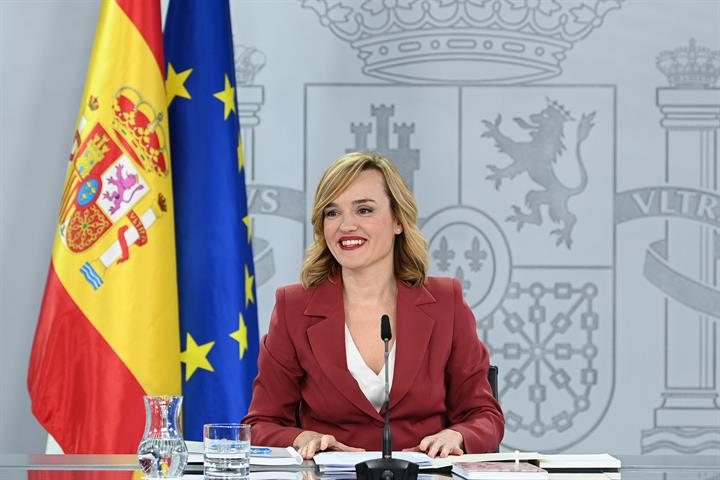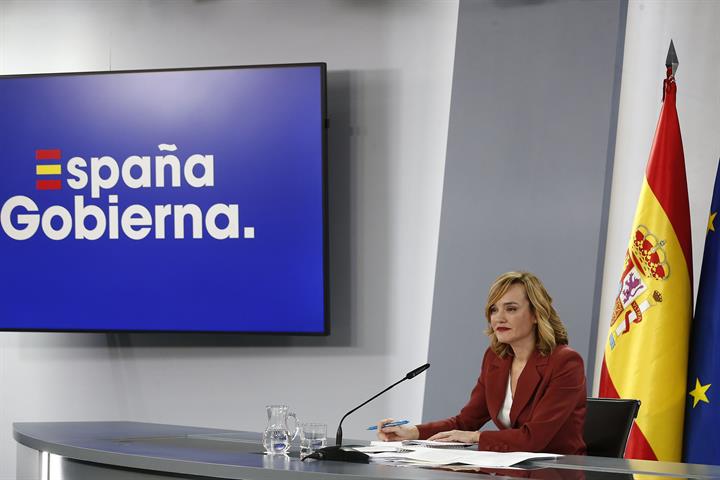Government of Spain strengthens qualifications, scholarships and career advancement opportunities in arts education
Council of Ministers - 2024.1.16
Moncloa Palace, Madrid
The Council of Ministers has approved the Draft Law on Artistic Education, whose parliamentary processing was interrupted in the Spanish parliament due to the calling of the last general elections. The regulation governs higher artistic and vocational education. This set of education system teachings aims to provide quality artistic training and guarantee the qualification of future professionals in music, dance, drama, plastic arts and design.
Benefits for students, teachers and arts workers
The Government Spokesperson and Minister for Education, Vocational Training and Sports, Pilar Alegría, stressed that the regulation has a "very wide consensus" from the political forces, and particularly from the more than 140,000 students and 14,000 teachers of these subjects. "Since 1990, when the LOGSE was approved, there had been no basic regulations for this education," Alegría pointed out.
As the minister explained, the first beneficiaries will be the students, who will be able to move around with the same guarantees as students from any EU member country, as their qualifications will have the same recognition and homologation. In addition, if at present the grants available to these students are similar to those for Baccalaureate students, with the new law the amounts of these grants will be similar to those received by university students.
With regard to teaching staff, Pilar Alegría pointed out that the regulation organises the different existing posts, which "will facilitate professional promotion".
The arts and culture sector is the third pillar of the law, which will enable the nearly 700,000 workers in this field to accredit their skills. According to the spokesperson of the Executive, the recognition of this experience will facilitate their professional promotion, and the recognition of an official qualification should they wish to continue their promotion through education.
Improvements in the prosecutor's career
 The Government Spokesperson and Minister for Education, Vocational Training and Sports, Pilar Alegría, during her speech at the press conference after the Council of Ministers | Pool Moncloa/Borja Puig de la Bellacasa
The Government Spokesperson and Minister for Education, Vocational Training and Sports, Pilar Alegría, during her speech at the press conference after the Council of Ministers | Pool Moncloa/Borja Puig de la Bellacasa
The Government has modified the staffing structure of the Public Prosecution Service, a decision that Pilar Alegría has framed within the area of improving justice, "attending to the demands of the professionals and listening to everyone with a clear objective, which is to provide a better public service to the citizens of our country", and "to offer useful policy".
The minister pointed out that the number of prosecutors has been steadily increasing over the last two decades to meet the needs of this public service, and that, on occasion, this increase has been accompanied by a mismatch between the professional categories and the position held by prosecutors. Therefore, among other measures, the Royal Decree approved today includes the upgrading of the status of 219 prosecutors.
Protecting minors from access to pornography on the Internet
The Council of Ministers has analysed a report containing a diagnosis of the protection of minors from access to pornography on the Internet and the serious impact it has on their emotional, affective and sexual well-being and development.
The Government Spokesperson and Minister for Education, Vocational Training and Sports, reminded the audience that this issue is of concern to society, especially families, and to the Government, as the chief executive, Pedro Sánchez, pointed out.
Pilar Alegría also stated that the data show that half of young people aged between 12 and 15 have consumed pornography at some time, and 25% of them admit to having done so for the first time before the age of 12. In addition, seven out of ten adolescents aged 13-17 years consume pornography on a regular basis, and 30% say that it is their only source of affective-sexual information.
 The Government Spokesperson and Minister for Education, Vocational Training and Sports, Pilar Alegría, during her speech at the press conference after the Council of Ministers | Pool Moncloa/José Manuel Álvarez
The Government Spokesperson and Minister for Education, Vocational Training and Sports, Pilar Alegría, during her speech at the press conference after the Council of Ministers | Pool Moncloa/José Manuel Álvarez
The minister said that access to this type of content at such an early age has obvious and logical consequences and negative impacts on minors, distorting their perception of sexuality, triggering emotional and psychological problems, prompting the development of inappropriate behaviour, normalising violence against women and promoting a serious risk of addiction to pornography. "Neither as a society nor as a government can we remain impassive in the face of this situation," she reiterated.
Lines of action of the Executive
The Government will address this issue with the development of an inter-ministerial strategy for comprehensive Internet protection, and it will pass a draft law with the same objective, creating age verification systems for accessing websites restricted to adults.
The spokeswoman pointed out that the Spanish Data Protection Agency is already developing a pilot age verification system, which has been tested in the main browsers and whose main objective is to protect minors from accessing adult content: "It is a pioneering initiative in Europe and we expect it to be up and running before the summer of 2024".
As for the inter-ministerial strategy, Pilar Alegría pointed out that it incorporates many areas, including education, equality, digitalisation and verification, with the aim of becoming a comprehensive law for the protection of minors on the Internet.
The minister called on all administrations, political parties and specialised associations to collaborate in solving this social problem: "We are talking about an intergenerational agreement for the country".
Non official translation





